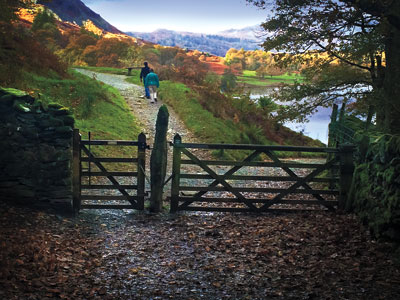
It’s often dangerous to go walking with an editor, especially when an editorial is due.
My wife and sons learned long ago the hazards of that periodic authorly intensity that tries to turn the stuff of everyday life into deathless prose. My boys even developed a childish alarm system, lest their offhanded sayings and doings end up embarrassing them before thousands of strangers: “Be careful—Daddy has an editorial due!”
Friends, however, know less about this intensity, and thus wander innocently through the fields of an editor’s imagination, unaware their words and images may suit his darker purposes.
(Here let me apologize to Jack and Debbie, dear friends for more than 30 years, who shared a recent hike with my wife and me in the sheep meadows of England’s Lake District. Yes, they are the ones pictured in the photo beside these words. But note—in their defense—that they have chosen the narrow gate and the upward path!)
There are many revelations you experience on the winding trail between the well-watered pastures of Ambleside and the quaint comforts of William Wordsworth’s Grasmere. First is the richness of the October sky, all shadowed and blue-spotted, as if the clouds were undecided about our need for further sunshine or more rain. Green—greener—grass, close-cropped by free-range sheep, rolls across fells more manicured than many fairways I have played. Lakes and streams brim with last night’s overflow of rain, all urgent on a burbling descent toward the Irish Sea.
But then a gate appears—actually, two—dividing life and travel into “before” and “after.” Gates and fences serve to restrict movement—sheep or human—and cause you at least a moment’s pause. You must, they silently insist, take note that where you now intend to go is at least subtly different from where you’ve been.
Never, however, in more than 50 years of wandering, have I seen the kind or arrangement of pasture gates that barred our path while meandering from Ambleside to Grasmere. I’ve always taken it as a matter of faith (or at least conjecture) that the narrow gate and the broad way leading downward were separated by some great distance—that one had to be deliberately looking for the one or choosing the other in order to find them. That John Bunyan’s “little wicket-gate” and the wide, smooth way leading to destruction could actually diverge from a single point had never gotten notice in the spiritual geography of my 57 years.
But there it was—as plain, as my grandmother might have said, as the nose on my face. The narrow gate, and the climbing path that leads away from it, is set immediately beside the wider gate and the smoother trail that promises more ease. You lift the latch on one mostly unaware of the momentous choice you have just made.
A certain casualness in the moment, a particularly intense burst of conversation, and your feet are headed toward a destination never fully chosen but nonetheless decisive. It makes at least a world of difference with whom you are walking when choices such as these appear. How crucial to have chosen well the ones—the One—with whom you walk, to trust that even when you aren’t fully aware, you are protected by the godliness, the prayerfulness, of those who travel with you.
We sanctify the importance of individuating choice: I choose the narrow gate; I shun the broader one. At least as urgent, however, is our choice of those who walk this pathway with us. These are they to whom God gifts the seeing when our eyes are dimmed, the hearing when our ears are disobediently dull, the believing when our faith is faint.
Choose well and wisely those with whom you share the path. Their faith, their obedience, and their vision may be just what you need.